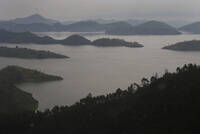Progress report for
AQUALEX Legal Mapping Tool

Achievement at a glance
AQUALEX is an offshoot (subset db) of FAOLEX, the world's largest collection of laws, policies and international agreements in the field of renewable natural resources, food and the environment. AQUALEX has, in addition to the up-to-date collection of laws, policies and international agreements related to water (now more than 24000 entries), now about 50 national and transboundary legal profiles. This makes AQUALEX more and more the global legal mapping tool, in particular for integrated Water Management purposes. In fact, AQUALEX is regularly brought to the attention of the international water community in conferences, forums, technical meeting, etc. and is now widely used by water professionals.Challenges faced in implementation
Although operational and on track, the project suffers from a lack of resources, as its final goal is daunting. It is the only global database on national and international water regulatory frameworks, and we need to complete legal profiles of more than 400 jurisdictions (about 200 countries and more than 200 sub-national jurisdiction). Although the collection of laws, policies and bilateral agreements is as complete as possible (over 24000 entries) FAO cannot guarantee improvements and even maintenance without adequate financing. We need partners, which would be justified as AQUALEX covers the whole water sector. Additional financial resources are desirable but also technical collaboration would be welcome.Next Steps
Expanding and improving the content (collection of laws, policies, and international agreements, water legal profiles), technical improvements, publicizing AQUALEX as a legal mapping tool.Beneficiaries
FAO, UN Water, other UN agencies and programmes, national governments law makers, national public bodies, researchers, academia, national and international NOGs. Within FAO, AQUALEX is a useful tool to provide guidance for the IWRM collaboration process involving almost all technical departments of FAO. FAO work covers or touches upon all aspects of the water cycle, but more specifically water for food production and aquaculture. Other aspects may well be related to work done by, for example, UNEP or WHO. National governments and law makers can benefit, whether assisted by FAO or not, from looking at how water is regulates in other countries.
